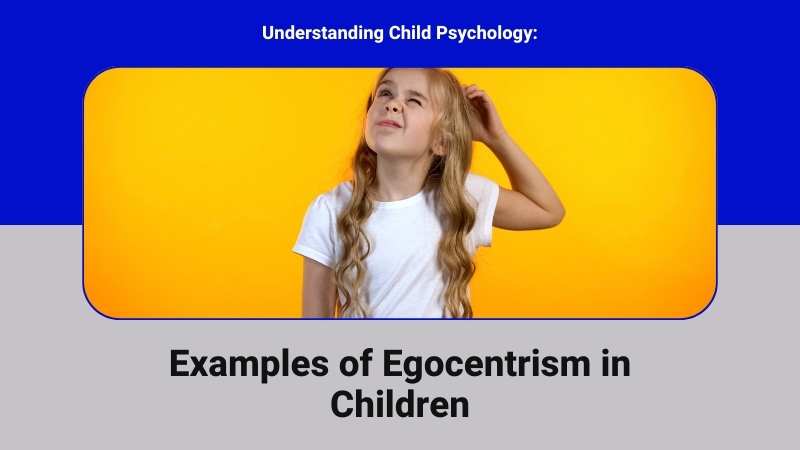
Egocentrism in psychology is the partial discrimination of the world and the self, counting others as well, and the propensity to distinguish, recognize, and understand the world in terms of the person.
Egocentrism in children
- Children below 7 have a lot of egocentrism as they are too young to understand what the other person is saying. In other words, they do their own thing and do not follow instructions.
- Only after they reach the ages of 6-12 are children able to appreciate what others have to say. After two years, they are in their infant state. Even as they grow a little bit older, they can still not understand what others have to say.
- Children are selfish Between the ages of 2-6. Ask them to pick up species of certain flowers and plants, and they will not be able to do so.
- Children between the ages of 7 and 12 can pick the species of flowers and plants you want them to do to understand and follow instructions.
- While speaking on the telephone, young children often nod their heads and do not say “yes” in response to a query from the other side. They feel by seeing their heads nod, and they can see the other person. They usually have created a mental image of the other person and feel they look like they have imagined.
Examples of Egocentrism in Children
This self-centered attitude en route to the globe is typical in younger children. They cannot separate their ideas, thoughts, and opinions from others. For instance, if a youngster notices that toffee is lying in a box, he can presume that somebody else taking a walk in the room is also aware that something is lying inside that box. He reasons that ever since he is aware of it, they are aware of it, too.
Research by Jean Piaget
Jean Piaget (1896-1980) maintained that young kids are self-centered.[1] This shall not signify that they are self-centered, although they do not possess the mental capacity to recognize that further natives shall have varied thoughts and ideas from their selves. Along with his associate Barbel Inhelder, Piaget conducted an exam to examine egocentrism, known as the mountains study.
Younger kids before age 7, in the purported pre-set phase, selected the image of the sight they observed and were thus discovered to need the capability to be grateful for a point of view diverse from their own. When getting into the supposed concrete-operational level at 7 to 12, kids come out competent in de-centering. They shall appreciate perspectives different from their own.
Criticisms of Piaget’s Research
Moreover, the mountains analysis has disapproved of concluding just the kid’s visuospatial knowledge rather than being self-centered. A chase on analyses comprising police dolls revealed that young kids could correctly state what the interviewer shall be noticing. It is considered that Piaget overrated the stage of egocentrism in children. [2]
Cognitive Development Stages and Egocentrism
| Cognitive Stage (Piaget’s Theory) | Age Range | Egocentrism Level | Key Characteristics |
|---|---|---|---|
| Sensorimotor | 0-2 years | High | Understands the world through physical actions, no awareness of others’ perspectives. |
| Preoperational | 2-7 years | High | Egocentrism dominates; struggles to see others’ viewpoints. |
| Concrete Operational | 7-12 years | Moderate | Begins to understand others’ perspectives, decentration occurs. |
| Formal Operational | 12+ years | Low | Can think abstractly, considers multiple viewpoints. |
Characteristics and Impact of Egocentrism
Self-centered egoism is, at last, the kid’s incapability to notice different people’s points of view. The kid at this level of cognitive growth presumes that their vision of the globe is similar to that of others. The conduct of a self-centered individual is a lot of the time obsessive. Egocentrism can also be valuable. There remains a strong confirmation that a self-centered, egoistic faith in one’s power can be because of gaining a lot more awareness regarding one’s attainments. As we all learn regarding others, our evaluation of our dominance reduces. Egocentrism is accomplished in several ways, a balanced or grounded tactic to self-other contrasts.
A study was done where the researchers studied egocentric and unemotional traits in children. The study involved 1,179 Dutch children (4-18 years) and 145 adolescents (12-18 years). The study found two main traits in children: self-centered and not showing emotions. The aggressive behavior in children was linked to both egocentric and unemotional traits. The antisocial behavior was more associated with narcissistic traits. The study’s findings suggest that few kids show self-centeredness, lack of feelings, and act out. [3]
Long-Term Effects of Unresolved Egocentrism
| Effect | Description |
|---|---|
| Difficulty in Relationships | Adults with unresolved egocentrism struggle to maintain healthy relationships due to inability to see others’ perspectives. |
| Poor Social Skills | Egocentric individuals may have difficulty collaborating with peers or empathizing with others. |
| Professional Challenges | Difficulty working in team environments or resolving conflicts at the workplace due to self-centered thinking. |
| Increased Aggression | Continued egocentrism can result in increased aggressive or antisocial behaviors in adulthood. |
Egocentrism vs. Empathy in Children
| Trait | Egocentrism | Empathy |
|---|---|---|
| Definition | Inability to understand others’ perspectives. | Ability to understand and share others’ feelings and perspectives. |
| Age of Onset | Typically found in children under 7. | Develops around ages 6-7 as cognitive abilities grow. |
| Behavior | Self-centered, focuses only on their own needs. | Considerate, recognizes others’ emotions and needs. |
| Social Interactions | Difficulty interacting and playing cooperatively. | Improved social skills, better at cooperation and sharing. |
References
- Brian Duignan, Emily Pronin – https://www.britannica.com/science/egocentrism
- Wikimedia – https://en.wikipedia.org/wiki/Three_mountain_problem
- Department of Clinical Child and Adolescent Studies, Leiden University, Leiden, The Netherlands. – https://pubmed.ncbi.nlm.nih.gov/20381866/
